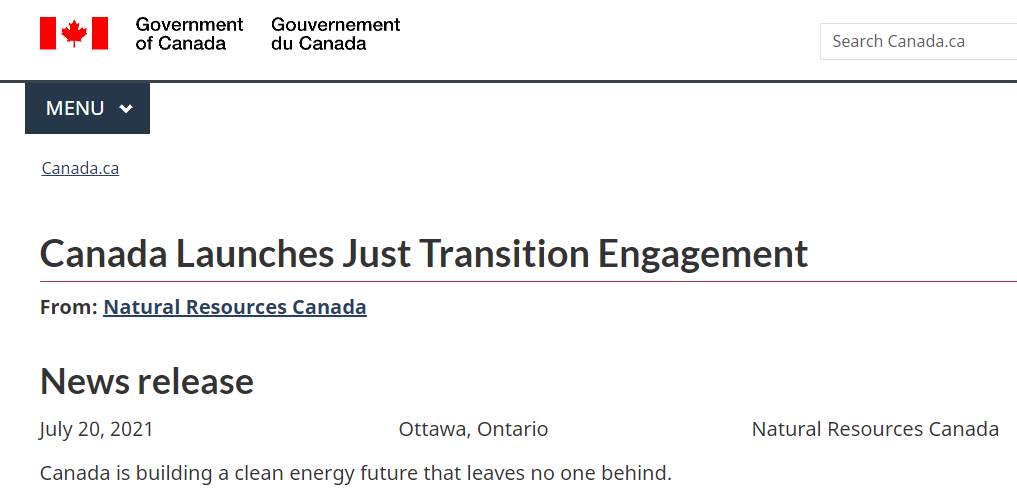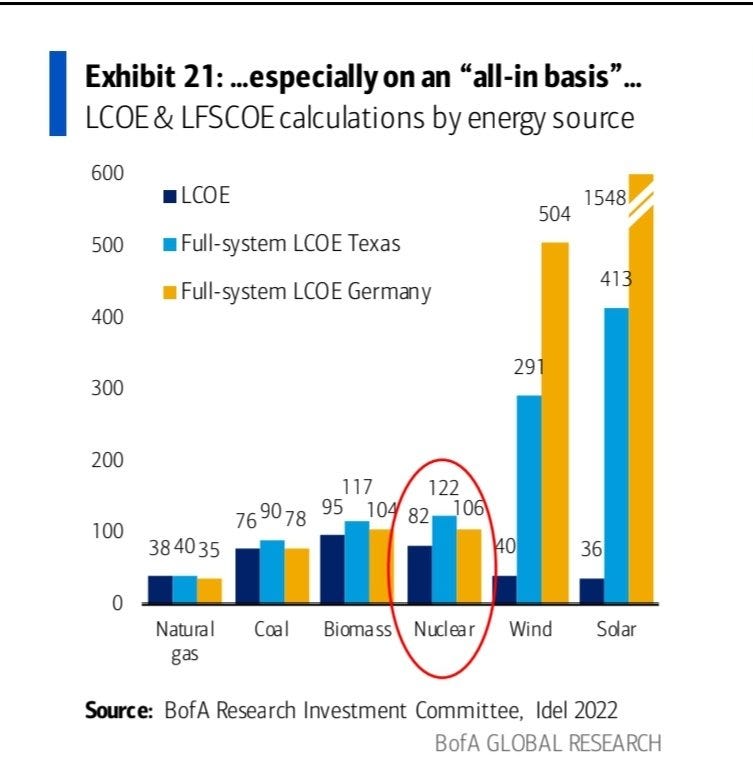One of the great things about being in political opposition is you can say almost anything, given that you don’t have to actually do anything. Your main problem is if/when you get into a position of power.
In the UK, the Labour party has been promising £28bn of annual “green investments” seemingly unaware that the window for easy vote-winning “green promises” that Bojo was dialled into in the run up to COP26 - is closing. With Labour now well ahead in the polls (as a reaction to too many years of one-part Tory rule), Labour are starting to realize that such a huge promise will have to be either actually, you know, funded, or watered-down. Real Politik dictates a heavy dose of watering-down, but in the fairytale world of green politics, punitive taxes on the rump of the UK’s oil and gas industry also seems like a good idea. Hurt the baddies, fund the goodies. The fact that this will kill off a significant source of revenue seems lost on the policy wonks.
Indeed, this logic extends to most activists - even if the motivations are of unimpeachable goodness (or not): bang your drum, chant your slogans.
Probably the most egregious example is the modern Just Stop Oil movement in which people who apparently have never thought about how the world in which they live actually works, seek to collapse it “for future generations”. I can hear the ironic “thanks” echoing from the future.
Whilst JSO gets a lot of headlines, and significantly less sympathy, the most dangerous manifestation of wishful thinking occurs when activists get to influence or indeed enact policy.
Building a clean energy future that leaves no one behind
In the of the rarified air of Davos meetings, in the corridors of power in Ottawa or London and in the Ivory Towers of academia - it is now a form of dogma that shutting down the fossil fuel industry is not just necessary, but entirely possible. To try to convince themselves (and the public as well as the targeted industry) that they are really nice people - they have invented the idea of “The Just Transition”. Yes, we want to shut down Canada’s largest export industry, but in doing so we will ensure no one is hurt (and oh, the economy will be fine).
When writing policy papers, it is incredibly easy to make this process sound inclusive, caring and above all achievable. The word-salads that abound are really quite remarkable and should be held up as some of the 21st century’s best works of fiction. The concept called The Just Transition became the official Canadian “Sustainable Jobs Plan” here.
Whilst not government policy, the fictitious “Ministry of Just Transition” (tag line: “The Ministry of Just Transition isn’t real, but it should be”) is hard to distinguish from the real thing.
The Just Transition is our collective undertaking to get Canada off fossil fuels fast while improving everything about how we live: how we move around, feed ourselves, earn a living, and take care of each other. This is not just the work of your government. This is the work of all of us.
We are leaving behind an economy that traps most of us in dead end jobs, while a tiny elite rakes in cartoonish profits. Instead, we are sharing the wealth and protecting the health of people and the planet. We are building a future based on care and repair. (source)
No, seriously, read it again. “get off fossil fuels while improving everything about how we live: how we move around, feed ourselves, earn a living, and take care of each other” and “we are sharing the wealth and protecting the health of people and the planet”.
Whilst this is heartfelt and pulls all the right emotional strings, it is just words. In case it’s not obvious from the above, marijuana is legal in Canada. I’m assuming someone was toking heavily whilst writing.
The “Just Transition” is an idea born from the parents of “saving the planet” and "being nice”. In the true spirit of the great dramatic traditions, one might be able to “suspend one’s disbelief”. Sadly, even if the rhetoric can be held in belief for a short while, the spell is broken when we find out that this has been tried before.
Before going there - let’s just look at the sheer scale of the question - according to the government’s own numbers
That’s over 2.7 million jobs at stake in the most affected sectors — almost 14 per cent of all jobs in Canada. The speaking notes prepared for Seamus O’Regan, the federal labour minister, try to put job-killing in a better light as “ensuring an equitable and prosperous future for workers and communities to take full advantage of the transition to a net-zero future.” ((my emphasis added), Jack Mintz in the Financial Post source))
Note the lovely platitudes: “ensuring an equitable and prosperous future for workers and communities to take full advantage of the transition to a net-zero future.” If these word-salad writers were foodies, they would be winning Master Chef.
However, as the former Critique (“Shadow” Minister) for Natural Resources Greg McLean has written here and here:
[The Sustainable Jobs Act] is modelled on a "just transition" plan for coal workers which was a disaster for workers and communities (although a lucrative boon for consultants and report writers).
To continue using Greg McLean’s commentary on the ‘The Just Transition for Coal Workers and Communities’
$185 million was allocated to communities who transitioned from coal power plants for a 7 year period ending 2025
To date, $52 million has been spent in 53 projects (less than a third, 5 years into a 7-year program)
$27 million was spent in Alberta
$18 million of that on a road in Nisku that is nowhere near any coal mines or miners
How were the other funds spent?
Transition plans; local area development plans; transition staff; consultant reports.
83% of funds went to municipalities and consultants, not workers.
Yes, this is just a slush fund
Hanna, Alberta was a key target – how did it fare?
Unemployment rose from 4% to 10%
Average house values fell from $177,000 to $65,000
Talk is easy, but execution is not part of this government’s skill set.
The Double Whammy
The poor management and/or misallocation of funds to a single coal project is lamentable. The read-through to how this would (not) work for an entire industry is truly horrific. But that’s not the worst part.
The worst part is that there seems to be no appreciation of how energy is the economy.1
With the Energy Transition - forget the workers. OK, maybe that is a bit callous, but you know what? They are smart people who understand hard work and will be fine if the economy is fine. Not everyone will “learn coding”, but life goes on.
==> If the economy is fine.
I’m not asking anyone to shed a tear, nor trying to get value by portraying O&G workers as victims. What I mean is that we don’t seem to understand where wealth comes from - and the most dangerous misconception of all is that we can transition to renewables and still have strong economies. That statement is entirely heretical and I expect organic pitchforks and electric torches to come for me, but hear me out.
The most dangerous misconception of all is that we can transition to renewables and still have strong economies.
The first part of the Double Whammy is the part that people have been denying for many years, but is becoming harder and harder to gloss over: the cost of energy in systems that have high penetrations of renewables will be higher. The frantic arm-waving and shouting about “lowest LCOE” is being challenged on many fronts, not least of which is “by reality”.
Pleasingly, it is no longer just angry bloggers, but as above, a major bank and below, the uber-smart and straight-talking CEO of Total
The long-serving chief executive of France’s TotalEnergies has warned that governments are mis-selling the energy transition if they fail to acknowledge the shift to a less-polluting system will lead to higher energy costs. “We think that fundamentally this energy transition will mean a higher price of energy,” Patrick Pouyanné said in a wide-ranging interview (source, FT)
Ok, so it’s going to be more expensive. Is that a big deal?
The second part of the double Whammy is much more difficult (and I have a separate post that has been languisihing/gestating for 6 months already, aimed at explaining this better ).
The concept of wealth is one that has various definitions, but we can think of it as being the ability to (a) survive nature and specifically (b) have to do very little work to survive. In the modern world this is possible due to having access to energy that is all but free. Over the last 150 years we have been progressivley better at accessing energy sources that give vastly more than we use in accessing them. You have to use energy to get energy, but when the “return” is huge, its easy to forget about the energy used in getting energy… I know that sounds a bit circular - because it is. We use a tiny proportion of our economy to get new energy, but the economy is huge because we have lots of cheap energy, so the proportion is small and that leaves vast surpluses for everything else. Oh, I went circular again.
Let’s try this.
Imagine you run a popular and profitable restaurant; it’s so good it has Michelin stars (subtitle - a good credit rating). Then one day your staffing costs rise. Staffing costs double or triple, but your revenues are more or less fixed. You have to make cuts, but where? Get by with on fewer waiting tables, reduce the kitchen prep staff, get cheaper ingredients? Reduce advertising? Delay redoing the decor? Cancek the pest-control contractor?
Pretty quickly, your restaurant starts to decline in quality and service and soon it loses its Michelin stars; footfall drops. Your revenues shrink - whilst your costs have stayed high. It took years to earn the Michelin Stars and only a few months for it to all come crumbling down - now you are facing bankruptcy as all your reducing income is used on just paying bills.
To push this analogy further, we can imagine that you did everything you could to keep the original standards - and in the face of rising costs you took out a bank loan to see you through to better days. But those better days never came, and the cost of the debt compounded your problems.
Without labouring the analogy too far - the double whammy is having increasing costs that cause reduced revenues. A business or a country might be able to manage one of these - but it is the correlation and indeed causation that should make politicians of any party sweat at night when casually saying “well yes, the energy transition will cost a bit more”.
The Government of Canada is taking action to promote decent work and well-paid jobs by growing the clean technology sector, promoting skills development and training, and diversifying local economies. The government is committed to sustainability across the economy, including through the creation of sustainable jobs so that all Canadians can enjoy the benefits of a clean economy.
Things Fall Apart
When a country has had 150 years (or more) of industrial development it has infrastructure and human capital that provide a robust buffer to the slings and arrows of outrageous fortune. But just as with the restaurant analogy above, the decay is gradual, then sudden. In the case of Germany, we are seeing this playing out in real-time, but arguably the UK is in a worse state. The deindustrialization happened earlier, and the “revenues” side of the ledger has been artificially beautified by 50 years of oil and gas production from the North Sea. This is coming to a natural end but being accelerated by poor policy. Do we see the paint starting to peel? Are we waiting longer at the table to get served? Is that a rat in the kitchen?
Helm Talks: Podcast 45: Why does everything seem to be broken? 6th September 2023 (Professor Dieter Helm)
Air traffic control, school buildings, the railways, potholes in the roads, leaking water pipes, local electricity networks failing when the wind blows from the wrong direction. Why does it feel that everything in Britain is broken? The real problem is a lack of capital maintenance. The assets need to be maintained and fixed when they break, paid for from current spending – not from new investment. Avoiding capital maintenance to save money is short-sighted. A functioning society and a functioning economy need the core infrastructures to be kept in a good condition, and the costs of not doing so are asymmetrically high.
Canada has optionality - with its vast natural resources - it has the possibility, should the politics allow - to increase its revenues and adsorb much of the unnecessary costs. At the very least North America can be self-sufficient in food, energy and manufacturing. Europe has a much weaker had and is throwing its cards away.
This problem is not confined to Canada - but is being acted out in real-time in Europe. (The subtle distiction is that Europe needs cheap energy to have an industrial/manufacturing base (since it has limited natuiral resources). Canada has both natural resources as well as an industrial/manufacturing base that relies on cheap energy.)










![One of the great mistakes is to judge policies and programs by their intentions rather than their results.” - Milton Friedman [720x720] : r/QuotesPorn One of the great mistakes is to judge policies and programs by their intentions rather than their results.” - Milton Friedman [720x720] : r/QuotesPorn](https://substackcdn.com/image/fetch/$s_!YZ4t!,w_1456,c_limit,f_auto,q_auto:good,fl_progressive:steep/https%3A%2F%2Fsubstack-post-media.s3.amazonaws.com%2Fpublic%2Fimages%2Fb44a6d09-1aab-4836-b2c1-7ffb4334c333_300x168.jpeg)
They'll need a link to this (after it's done).
https://open.substack.com/pub/argomend/p/the-laymans-guide-to-electricity?r=28g8km&utm_campaign=post&utm_medium=web&showWelcomeOnShare=true